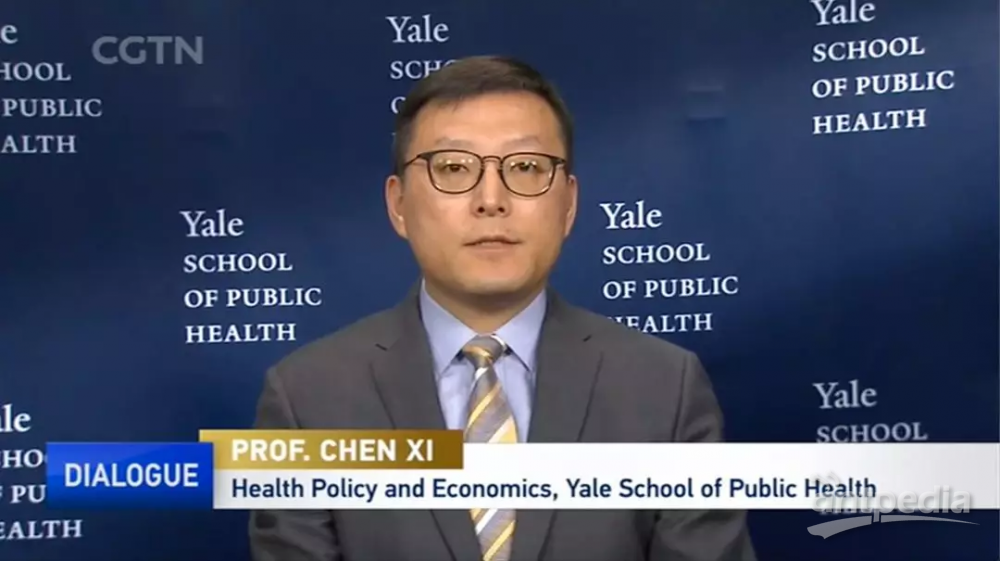耶鲁教授:新冠肺炎进入关键节点,接下来应该如何打?
随着新型冠状性病毒感染者数量和多个国家都出现疫情的事实,世界卫生组织宣布将新型冠状病毒疫情列为“国际关注的突发公共卫生事件” (Public Health Emergency of International Concern)。
对于新冠病毒药物和疫苗研发,我们该抱有怎样的期待?疫情的拐点何时到来?对于已经“自我隔离”了十余天的多数中国人而言,这场新型冠状病毒的“全民阻击战”接下来应该如何打?
中国国际电视台(CGTN)主持人邹悦在《对话》栏目中采访了耶鲁大学公共健康和社会政策助理教授陈希,就疫情的当前防控和未来走势提出了一些关键问题。
(下文为对话的英文摘录和中文翻译,摘录时有删改。)
01
Moderator: Mr. Chen, where are we in terms of this fight against a new coronavirus?
Chen: Yes, this virus outbreak has very much caught us off guard and it has spread very quickly and it’s very contagious, and the origin of this virus is still unknown. It looks like the death rate is lower than SARS but more people are impacted at a much faster speed. So we have very limited time to respond but I think the release of information about the human to human transmission led the government to take many measures, like the lockdown of the major cities. And there was some evidence showing that the lockdown has been effective because they found a lower number of transmissions, which means that people who were infected are infecting fewer people. So the number is going down, and that’s great. And also the Chinese government wanted to extend the holiday season in order to bypass the risk of transmission during the incubation time to make everyone safe. They also are taking very concrete measures in health policy like insurance reimbursement and are also trying their best to enforce the screening of people in primary care before they flood into the hospital.
主持人:陈教授,您认为我们目前抗击新型冠状病毒的斗争处在什么阶段?
陈希:新型冠状病毒爆发非常突然,且其传播速度非常之快,让我们有些措手不及。目前也尚未找到病毒的源头。相比SARS, 这次的病毒致死率相对较低但是传染速度更快,以致于我们的反应时间非常有限。在确定该病毒具有人传人的属性后,我认为政府的确采取了很多措施,如封锁病毒高发城市。有数据表明武汉封城对于缓解疫情传播起到了有效的作用,这样可以控制病毒不至于传播更多的人。而且,政府也延长了春节假期度过病毒的潜伏期,以避免更大规模的感染。同时,中国的医疗体系也采取了有效手段,如医保报销,并且尽量尝试在基层医疗对居民进行筛查,避免大量人群涌向大医院。
02
Moderator: A lot of people are asking the same question: are we approaching the turning point? Because over the past 10 days we’ve seen cases jumping from a hundred to ten thousand. What do you make of the increased speed of infected cases in China?
Chen: I think the current data assessment shows that it’s still on the rise but we are closer to what we would call the “plateau” of this infection. So we see more fluctuations in the trend of new confirmed cases and new suspended cases which are good signals because that means we are closer to a more stabilized point where the new cases will be gradually stabilized and hopefully soon reducing. So we are closer and we should be confident although it will take more time, could be like 10 days or so.
主持人:中国抗击新型冠状病毒是否已经到了关键节点?在过去的10天内,受传染人数从百人左右迅速上升到了超过一万人,是什么造成了中国如此之快的感染速度?
陈希:我认为目前的数据表明受感染人数依然呈上升趋势,但是已接近平稳期。能看出新增确诊病例和疑似病例的数量上有所波动,这预示着疫情即将趋于稳定,之后数量将逐步下降。这个时候我们应该更加自信,当然这也需要大概10天左右的更长时间。
03
Moderator: A lot of people worry about the phenomenon of some people who may not show any symptoms but still could carry the virus, and they could be spreaders. How concerned are you about this?
Chen: Yes, I would say this is really indeed a concern, but I would say most of the cases have shown symptoms before they are infecting others. So I think a good way to enhance health education and to help promote the healthy behavior of individuals is to show the correct way to wear face masks and also encourage frequently washing hands. Those avoidance behaviors of protection will reduce the chance of being infected by those without symptoms. And this is also a concern for different countries in the U.S., Europe, and other countries; they also have found some symptomatic cases, so they are taking measures. And if that is the case, the patient should stay at home and be screened before they go into hospitals. They should take more cautious measures in order to avoid all people going to the hospital and causing further infection.
主持人:处于尚未有症状的潜伏期患者依然具有病毒传播性,我们应该如何预防潜伏期传播呢?
陈希:没错,这的确是一件很令人担忧的事情。但是,好在大部分的患者都是在传染其他人之前出现的症状。所以我认为一个有效的预防措施就是提高个人卫生教育,比如我们应该正确佩戴口罩、勤洗手等等。这些预防措施能够降低被感染的风险。同样,新型冠状病毒在美国、欧洲等国家也相继发现,所以他们也应该警惕潜伏期传播的风险。如果患者处于潜伏期,应该将自己隔离在家中,并且在去医院之前应该先进行体温检测,从而避免涌向医院后的交叉感染。
04
Moderator: As you said, the epicenter Wuhan with a population of 11 million people is now in lockdown, and also the central government is encouraging people all over the country to have minimal travel. How long do you think this kind of restriction of movement will be in place in this massive, populous country?
Chen: I think the very critical time point was the starting date of the lockdown, meaning when the last group of people were leaving Wuhan, they would still have an incubation time period and that takes time for them to develop symptoms. So it really depends on the length of incubation and incubation time, which according to the current evidence, it could last from 4 days till 10 days. Thus, early February would be very dangerous for those individuals to be developing any symptoms. So, I would say it could be like a little bit later than February 2, which is the end of the public holiday. The government may have already considered this in deciding to extend the public holidays, especially for some certain occupations. And the government may want to screen the flow back for the people who are leaving Wuhan because that reduces the population density of the traffic transportation system.
主持人:正如您所言,拥有一千一百万人口的武汉作为疫情爆发的中心已经被封城,中国政府也在建议尽量减少全国范围人口的流动。您觉得这种限制将会持续多久呢?
陈希:我认为一个很重要的时间节点是封城前,有最后一批人群离开武汉,他们中有一部分人极有可能处于病毒潜伏期。根据目前的数据,潜伏期的时间一般在4天至10天左右。所以2月初是个非常危险的节点,这些人中可能会出现发病症状,我个人认为出现症状的时间会比2月2日再晚一些。政府已经考虑到了这一点,所以他们让大部分企业延长了春节假期,并且加强对返程人口的体温排查,以降低公共交通的人群密集度。
05
Moderator: But the lockdown happened on January the 23rd. And Wuhan’s mayor said 5 million travelers already left the city before the lockdown and they are all stranded in different places all over the world. And they are actually trying to stay quarantined, but still how worried should we be when these people are moving back to their city or moving elsewhere?
Chen: That’s a great question. So, when they return back, they already passed the incubation time. So they should be safe without transmitting the disease to others. So we should be more worried about things like stigma. The WHO Director-General mentioned that we should have more solidarity instead of stigma. So that means we really need to treat them without discrimination. And one more thing I worried a little bit about is those 5 million people, many of them went back to their home county, the villages. And we know that rural China is a weak point for infectious disease. We should monitor not only urban areas, but also keep a close eye on rural counties. That’s very important.
主持人:武汉封城是在1月23日,武汉市长说有500万人群在封城之前从武汉离开并且涌向世界各地。虽然他们一部分人有效地进行了隔离,我们是否仍然需要担心他们再回到武汉或者其他地方呢?
陈希:这是个很好的问题。当他们返城时,由于已经过了潜伏期,他们应该是没有传染给其他人的风险的。所以我们更应该担心的是歧视问题。世界卫生组织总干事也提到我们在这个时候更应该同心协力而不是产生歧视。另一个我比较担心的问题是,这500万流动人口中,有许多人回到了乡村。我们知道中国的乡村目前处于病毒传染的薄弱环节。我们不应该只关注城市,更应该做好乡村的疫情防控,这一点尤为重要。

耶鲁大学公共健康和社会政策助理教授陈希
06
Moderator: So Dr.Chen, it seems like a vaccine is still several months down the road, so medically what is the best way to treat those patients, and can the medical facilities handle tens of thousands of patients right now?
Chen: I think currently the healthcare system is overwhelmed, there is no effective cure and the vaccine needs at least a few months time to be developed. But there is some encouraging news: the declaration of an emergency of international concern will accelerate information sharing and collaboration in the scientific world to fasten the development of a vaccination and any kind of therapeutics. It takes time because it needs animal testing and human testing, but it will fasten this process.
I heard from the news that a vaccine will be developed within the next couple of months.
And there is encouraging news that the WHO and global communities are coming in to join this initiative. More and more pharmaceutical companies are joining. And the funders and donators are trying to fund those kinds of research and development.
主持人:陈教授,疫苗研发似乎还需要几个月时间,从医学上来说,治疗这些病人最好的方式是什么?目前的医疗设施能应对上万病人的治疗吗?
陈希:我认为目前的医疗系统负担确实有些重,目前还没有对症的治疗办法,疫苗需要至少几个月才能被研发出来。但是一个好消息是由于被宣布为“国际关注的突发公共卫生事件”,这将加速科学界的信息共享合作,从而加速疫苗和其他疗法的研发。到目前为止,这需要时间,因为还需要大量的动物试验和人体试验。但国际上的关注会加快这一进程。
我也从新闻上获悉,疫苗将在接下来的几个月被研发出来。而且好消息是,世卫组织和其他全球社区都将参与进来。更多的制药公司也在加入进来,而且一些资助者和捐赠者也在出资推动研发。
07
Moderator: We’ve actually been here before, 17 years ago, when China witnessed the outbreak of SARS. But in terms of the medical care system and scientific research capabilities, is China better off now than 17 years ago?
Chen: Yes, I would agree with that and also after SARS, China’s CDC developed a system they called the surveillance early warning system of infectious disease. So the system was linked in the local hospitals with the CDC directly. So any infectious disease cases, about 5 cases, then they are able to trigger this warning system. They have to press a button and fill out some information, then the national level of the CDC would receive it. However, this early warning system tends to be insensitive to new types of infectious diseases. In such cases, local medical workers even have difficulty reporting, which could weaken the functioning of the early alerting.
But I would say that we still need to strengthen our primary care system. In the last ten years, China just celebrated the 10th year anniversary of new healthcare reform. But that reform mostly focuses on empowering hospitals. So we still need time to develop the integrated care system to empower local care. So then people will have better care options to treat those mild symptoms instead of flooding into the hospitals, which will be very dangerous in the case of infectious diseases. People can be cross-infected.
主持人:其实我们遇到过这种状况,17年前,中国经历了非典的爆发。目前从医疗系统和科研能力的角度来看,中国的应对能力是否比17年前更强?
陈希:是的我同意,而且经过“非典”后,中国疾控中心开发了一个系统,他们叫这个系统为“中国传染病与突发公共卫生事件监测信息系统(简称网络直报系统)”,这套网络直报系统会将各地医院和疾控中心直接连接起来。所以一个地方发现了任何传染病病例超过5例,就自动触发核查机制。只要医院就点击报告病例,并填写相应信息,中国国家疾控中心马上就能收到。然而这个系统对于过去未曾发生过的传染病类型不敏感,以致出现这种情况后当地医务人员无法上报。因此,无法更有效地达到预警之目的。
但我想说,我们仍然需要加强初级保障系统。中国刚刚庆祝了新医疗改革十周年,不过这项改革大部分聚焦在加强医院的管理,我们仍然需要时间去开发整合型的保障系统从而加强地方医疗保障,让人们能有更好的医疗场所治疗轻微的症状,而不是全都涌向大医院。这对传染性疫病来说非常危险,人们会交叉感染。
08
Moderator:And very briefly, what worries you the most and what encourages you the most at this moment?
Chen: What worries me the most is uncertainty. I think this epidemic could have brought us more infected cases and higher case fatality rates given vulnerable healthcare systems and a low level of preparedness in many countries, not only for China, but also countries with fragile health systems like the WHO Director -General mentioned. So I think that was part of the reason he was announcing this emergency.
And what encourages me the most is that the government really is taking timely measures to share the gene of the pathogen, and also very stringent measures to lock down major cities to cut the flow of transportation. That was unprecedented, otherwise we would be in a worse situation.
主持人:您能不能简要和我们说说什么最让您担心,什么又能让您看到一些希望?
陈希:最让我担心的是不确定性。我认为这次疫情真的在全球多国脆弱的医疗体系和不充分的应对下很可能带来更多的传染和更高的死亡率,不仅是在中国,也是世界卫生组织总干事提到的对于很多具有脆弱的卫生健康体系的国家。所以我想这也是为什么世界卫生组织宣布这一突发事件的部分原因。
最让我觉得有希望的是政府采取了及时的措施分享病原体基因,而且也采取非常严格的措施把主要的城市封住以减少交通带来的人员流动。这也是史无前例的,否则我们真的会陷入一个更不好的境遇。
-
焦点事件

-
焦点事件

-
企业风采

-
企业风采












